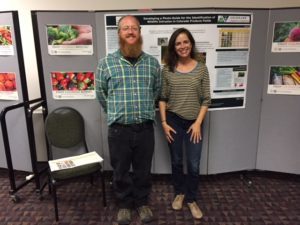
Carolina Mariano Ferraz had her first experience with foodborne health risks in her home country of Brazil. There she worked as a food safety apprentice in several restaurants, and what she learned behind the scenes about food handing, preparation and safety subsequently influenced where she chose to eat.
She learned that issues of food safety begin long before food even enters the kitchen. In the case of produce, safety begins in the field, even before soil is prepared to receive seeds.
“All the produce outbreaks happening around the U.S. have a tremendous impact on people’s confidence buying produce and on food system businesses,” she explained. “I connect this subject with public health because it involves not only protecting the health of populations, but also the health of farm communities, local food and food systems in general.”
During the 2018-19 school year, Carolina, a second-year MPH student in the Public Health Nutrition concentration at ColoradoSPH at CSU, received hands-on education as a produce safety fellow. The produce safety fellowship, awarded to two or three CSU graduate students each year, is funded by a U.S. Food and Drug Administration grant administered by the Colorado Department of Agriculture in partnership with CSU.
Heather Marshall, a 2018 ColoradoSPH at CSU MPH graduate, was a produce safety fellow in the program’s inaugural year. MPH students Amy Blom and Mayra Ramirez, along with horticulture student Harley Combs, have been named food safety fellows for the upcoming school year.
Dr. Marisa Bunning, a faculty member in the Animals, People and the Environment concentration and a co-investigator in the project led by CSU Extension Specialist Martha Sullins, said that field-to-table produce safety has not been recognized as an area of interest and research until fairly recently.
“I think one of the reasons produce safety is very challenging is due to the wide range of issues,” Bunning said. “These are foods are grown outdoors, they’re highly perishable botanical foods as opposed to meats that are going to be cooked. Until we really started examining produce safety, it was more common to associate food safety issues with food handling errors in restaurants and kitchens.”
Field-to-table produce safety
The produce safety fellowship was established in response to the FDA’s 2011 Food Safety Modernization Act, whose goal is to protect public health by creating safer food production through the entire food chain, starting at the farm level.
 During her fellowship, Carolina spent time learning how to manage the quality of water used in agricultural production and post-harvest processes, as well as studying wildlife, soil and harvest management. She also participated in trainings, conferences and on-farm activities, visiting farm operations, laboratories and other food facilities.
During her fellowship, Carolina spent time learning how to manage the quality of water used in agricultural production and post-harvest processes, as well as studying wildlife, soil and harvest management. She also participated in trainings, conferences and on-farm activities, visiting farm operations, laboratories and other food facilities.
“Preventing health issues caused by foodborne illness is a big factor to promote health, decrease healthcare costs and improve food distribution,” Carolina said. “Also, ensuring that resources and the environment are being used in an efficient way is part of making a better food system that can sustain access to healthy food for everyone.”
Bunning noted that Centers for Disease Control and Prevention research has found that almost half of all foodborne illness cases are linked to produce “and we need to address that. It creates a tremendous health and financial burden and foodborne illness can almost always be prevented.”
The produce safety fellowship, Bunning said, gives students a comprehensive, multi-disciplinary education in produce safety and allows them to create new materials or tools that will benefit growers – from mitigating wildlife incursion to effective use of cleaners and sanitizers. Carolina currently is working on a project to help Colorado’s produce growers better understand how to select and use appropriate cleaners for food contact surfaces.
“It is rewarding ensuring that individuals and populations can be safe when doing one of the most enjoyable activities: eating,” Carolina said. “Food safety guarantees that the eating experience is full of flavors and great moments instead of harm.”
